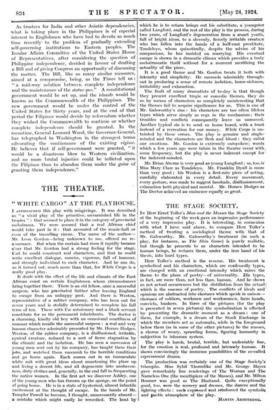THE THEATRE.
"WHITE CARGO" AT THE PLAYHOUSE.
AIVROACUED this play with misgivings. It was described as "a vivid play of the primitive, unvarnished life in the tropics " : that seemed to place it in the category of provincial melodrama. We were assured that a real African chief would take part in it : that savoured of the music-hall or even of the travelling circus. The name of the author— Mr. Leon Gordon—being unknown to me, offered no re- a-isurance. But when the curtain had risen it rapidly became c'ear that Mr. Gordon had a strong feeling for the stage, t'iat he could construct real characters, and that he could write excellent dialogue, concise, vigorous, full of humour, and strongly individual to each character. And he can do, as it turned out, much more than that, for White Cargo is a really good play.
It deals with the effect of the life and climate of the East African coast on certain Englishmen whom circumstances bring together there. There is an old fellow, once a successful surgeon, who has gravitated thither after leaving England to escape from an unhappy past. And there is Weston, representative of a rubber company, who has been out for seven years and is stolidly determined to complete his full term of ten. These with Vie missionary and a black servant constitute for us the permanent inhabitants. The doctor is a charming, kindly old boy with an occasional courtliness of . manner which recalls the successful surgeon : a real and very human character admirably presented by Mr. Horace Hodges. Weston, of the rubber company, is a disillusioned, irritable, cynical creature, reduced to a sort of fierce stagnation by the climate and the isolation. He has seen a succession of young men sent out by his company, has taught them their jobs, and watched them succumb to the horrible conditions and go home again. Each comes out in an immaculate white suit with great ideas about smartening the place up and living a decent life, and all degenerate into unshaven- ness, dirty clothes and, generally, in the end fall to frequenting the native women. In the first act we discover Ashley, one of the young men who has thrown up the sponge, on the point of going home. He is in a state of hysterical, almost infantile excitement at the thought of escape. In the hands of Mr. Templer Powell he became, I thought, unnecessarily absurd— a mistake which might easily be remedied. The boat by
which, he is to return brings out his substitute, a youngster called Langford, and the rest of the play is the process, during two years, of Langford's degeneration from a smart youth, full of bright ideas, to a slovenly, fiercely irritable creature who has fallen into the hands of a half-cast prostitute, Tondeleyo, whom quixotically, despite the advice of his companions, he has insisted on marrying. His eventual escape is shown in a dramatic climax which provides a truly melodramatic thrill without for a moment sacrificing the actuality of the piece.
It is a good theme and Mr. Gordon treats it both with: intensity and simplicity. Ile succeeds admirably through- out in producing a sense of remote isolation, home-sickness, irritability and exhaustion.
The fault, of many dramatists of to-day is that though they present excellent tragic or comedic themes, they do
so by means of characters so completely uninteresting that the themes fail to acquire significance for us. This, is one of Mr. Galsworthy's sins : his characters are too often lifeless types which serve simply as cogs in the mechanism ; their troubles and conflicts consequently leave us unmoved. Another typical sin is to send us home bored, with a tract• instead of a recreation for our money. White Cargo is un-
tainted by these errors. The play is genuine and single- minded and the characters are flesh and blood : they enlist our emotions. Mr. Gordon is extremely outspoken ; words which a few years ago were taboo in the theatre occur with some frequency, but ,the play is never indecent -except for I the indecent-minded.
Mr. Brian Aherne is very good as young Langford ; so, too, is' Miss Mary Clare as Tondeleyo. Mr. Franklin Dyall is more than very good ; his Weston is a first-rate piece of acting, carefully elaborated in every detail'. Every movement, every gesture, was made to suggest lassitude, disillusionment, exhaustion both physical and mental. Mr. Horace Hodges as The Doctor achieved an eminence equally as great.










































 Previous page
Previous page